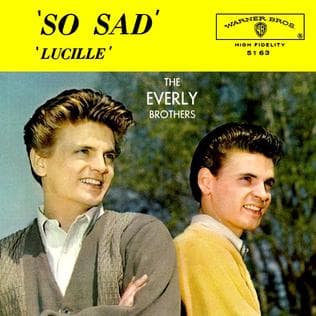
💔 The Echoing Heartbreak: Witnessing Love’s Quiet Collapse
A melancholic ballad capturing the universal sorrow of a relationship fading into irreparable distance.
The year was 1960, a time when the perfect vocal blend of The Everly Brothers, Don Everly and Phil Everly, seemed to be the sonic blueprint for youthful longing and sweet heartbreak. Their hit single, “So Sad (To Watch Good Love Go Bad)”, was released in August of that year on the Warner Bros. label as the A-side (or a prominent side, with “Lucille” as the B-side, though often charted together) from their album, It’s Everly Time. This song, penned solely by Don Everly, demonstrated a maturity in songwriting that went beyond their earlier, more buoyant rock and roll hits. It wasn’t just a fleeting teenage crush gone wrong; it was the profound, aching sorrow of witnessing a deep, mature relationship wither away.
The song’s performance on the charts reflected its immediate, resonant appeal. In the United States, it peaked impressively at No. 7 on the Billboard Hot 100 and reached No. 9 on the Cash Box Top 100, spending twelve weeks on the Hot 100. Across the pond, it was an even bigger hit in the United Kingdom, soaring to No. 4 on both the Record Retailer and New Musical Express charts. These chart positions solidify “So Sad” as one of the essential tracks from the duo’s golden era, right before their career was temporarily interrupted by military service. It wasn’t just a hit; it was a global phenomenon that proved the Everlys’ ability to transition their sound seamlessly into a more reflective pop territory while retaining their country-music roots.
The story behind the song is often attributed to Don Everly‘s personal observations and experiences, granting it an autobiographical authenticity that cuts deep. Unlike the energetic, immediate pain of a song like “Cathy’s Clown,” “So Sad” is about a slower, agonizing realization. The lyrics are a masterpiece of understated emotional wreckage. The narrator is both a participant and a detached observer, watching his own love die. He sings, “It makes me cry to see love die / So sad to watch good love go bad,” framing his personal tragedy as a universal, almost global, travesty. There is a sense of helpless inevitability—he remembers the passion, the promises (“You said nothing could change your mind”), but now he can only stand by as the life drains out of the connection. The song’s genius lies in its simplicity and the heartbreaking truth it tells: the worst kind of sorrow is watching something inherently good become irreversibly corrupted or lost, not in an explosive argument, but in a quiet, painful surrender.
This emotional depth is magnified by the Everly Brothers’ signature sound. The melancholy, minor-key melody, coupled with their trademark close, ethereal harmonies, creates an atmosphere of profound and gentle despair. Don’s lead vocal carries the burden of the sadness, while Phil’s harmony floats above, intertwining like the ghost of the love that once was. The production is sparse and effective, often highlighted by the snappy, melancholic piano work of the great Floyd Cramer, which adds a final layer of sophistication and sorrow. It’s this combination of honest lyricism, haunting harmony, and country-tinged instrumentation that has cemented “So Sad (To Watch Good Love Go Bad)” as an eternal classic, a song that speaks to anyone who has ever felt the slow, unbearable drift of a cherished romance coming to an end. It’s a bittersweet memory set to music, one that, half a century later, still sounds as true and as sad as the day it was released.